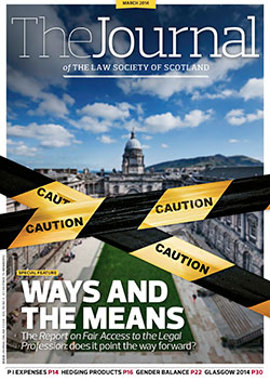Mandatory mediation: better for children
Family mediation helps resolve issues between separating couples more quickly and more cost effectively than those cases that go through the courts. It is estimated that around 70% of mediations result in an agreement being reached.
Mediation is currently receiving high levels of media attention across the UK. The Westminster Government is progressing legislation to require separating couples involved in parenting or financial disputes to meet with a mediator prior to going to court. In Scotland there is no automatic compulsion for separating couples to consider family mediation.
No-one disputes that divorce and separation are a challenging process for all concerned, and that children are often caught in the middle of a war that is raging around them.
Parents often lose their focus on their children as they battle with their ex-partner to determine who gets what, and who the children are going to live and spend their time with.
Solicitors are the first port of call for many separating couples, and legal advice is important. It can, however, further polarise separating couples as each solicitor acts in the best interest of their client. By the time the case gets to court, accusations will often have been made, positions may have become entrenched, and conflict will frequently have escalated.
There is, however, a better way to resolve disputes, and this has been recognised by the Scottish Government and judiciary for some time.
The proposed reforms to the civil justice system in Scotland, through the Courts Reform Bill, include the increased use of alternative dispute resolution (ADR) processes including mediation, and for a range of issues, not just family cases.
There has been a rule of court covering referral to mediation in Scotland (Ordinary Cause Rules, rule 33.22) for family actions since 1996. Sheriffs may refer couples to a mediator to encourage them to resolve their disputes themselves.
Additionally, the Civil Evidence (Family Mediation) (Scotland) Act 1995 ensures that the matters discussed in mediation cannot be used as evidence in court, where the mediation has been conducted by a mediator accredited to a specified mediation organisation.
This means that people can talk more openly in mediation without the concern that what they say will be used against them in court. In Scotland the only two organisations approved to accredit mediators for the purposes of this Act are Relationships Scotland and the Law Society of Scotland.
But there is still a problem in Scotland. The level of awareness and understanding about family mediation remains low. Many people haven’t heard about mediation, haven’t needed to use a mediator and aren’t sure what the process involves.
When crisis hits, many couples will automatically think that their first port of call is a solicitor. Making it compulsory for couples to see an accredited family mediator before going to court, to determine whether mediation is right for them, would ensure that they had considered all the options open to them. In Scotland, if introduced, the mandatory requirement would be to attend an information meeting where the individuals' situation can be explored, the mediation process would be explained, and a decision made as to the best option for resolving the dispute – which may or may not be mediation.
There are certain situations, for example where there are domestic abuse issues or child protection concerns, where mediation would not be appropriate, and in such cases there would be no requirement for couples to explore the potential of family mediation. Mediation is, essentially, a voluntary process in which people need to be prepared to listen, discuss and negotiate.
The compulsory information meeting would, however, shed light on a process that could lead to better outcomes for many families.
The UK Government is encouraging families in England & Wales to resolve their disputes without recall to the court process, wherever possible. Relationships Scotland believes that this is better for children and families.
The Scottish Government is also supporting families to work together in the best interests of their children; however, we believe it could go further in ensuring greater understanding and proper consideration of alternative methods of resolving disputes.
Mandatory meetings with a mediator, to find out more about the mediation process and how it might help, prior to hearing a family case in court, would deliver a step change in the use of family mediation, resulting in better outcomes for children and families. This would also deliver a significant saving to the Scottish court system and the Scottish legal aid bill.
In this issue
- The role of "attachment" in child custody and contact cases
- No protocol – what expenses?
- Ecocide: a worthy "fifth crime against peace"?
- Mandatory mediation: better for children
- Reservoir safety regulation: a changing landscape
- Reading for pleasure
- Opinion: Mark Hordern
- Book reviews
- Profile
- President's column
- Digital deeds move closer
- Fair access - a fair way to go
- No protocol – what expenses? (1)
- Hedges: not all bad news
- Daring to be different
- Financial planning or wealth management – is there a difference?
- Success in the balance
- Wealth management for business leaders and owners
- Purpose of the protocol
- Actionable data wrongs?
- Land Court: business as usual
- Penalty points
- Scottish Solicitors' Discipline Tribunal
- Fever pitch
- Heritage regained
- All grist to the mill
- Wills: is it OK to act?
- Gongs, dinners and just deserts
- Perils of the home
- Ask Ash
- Scots lawyers debate Union in London
- Public Guardian news roundup
- Law reform roundup
- Personal Injury User Group at your service
- Diary of an innocent in-houser






